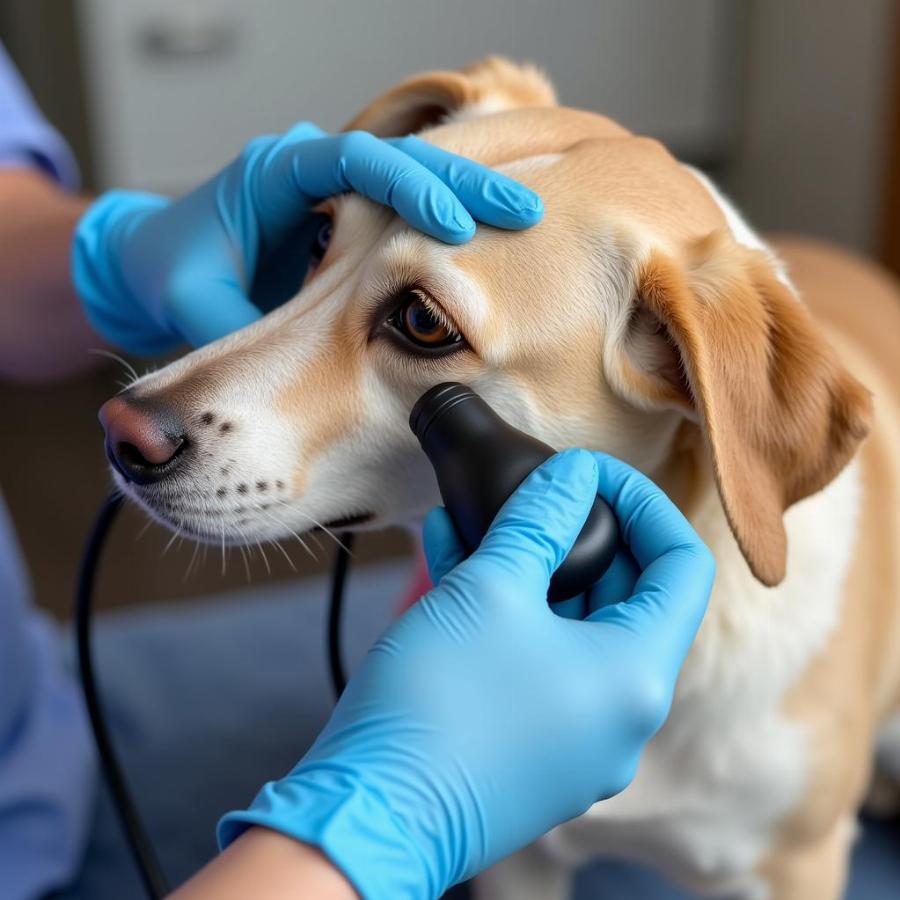Finding black stuff in your dog’s ears can be alarming, but don’t panic! While it can sometimes signal a problem, it’s often nothing serious. This comprehensive guide will delve into the common causes of black gunk in dog ears, how to identify potential issues, and what steps you can take to keep your furry friend’s ears clean and healthy.
Understanding the Black Stuff: What Is It?
That black gunk in your dog’s ears is a combination of earwax (cerumen), dead skin cells, oil, and sometimes, dirt. All dogs produce earwax as a natural way to protect and lubricate the ear canal. However, excessive buildup of black, brown, or reddish-brown earwax can indicate an underlying issue.
Common Causes of Black Ear Discharge in Dogs
1. Ear Infections
One of the most frequent culprits behind black ear gunk in dogs is an ear infection, also known as otitis externa. Yeast and bacteria thrive in warm, moist environments like a dog’s ear canal. Excess wax creates the perfect breeding ground for these microorganisms, leading to an infection.
Signs of an ear infection:
- Head shaking or tilting
- Scratching at ears
- Redness or swelling in the ear canal
- Foul odor coming from the ears
- Pain or discomfort when touching the ears
Expert Insight:
“Ear infections are particularly common in dog breeds with floppy ears, like Cocker Spaniels and Basset Hounds. Their ear canals have less ventilation, making them more prone to moisture buildup and infections.” – Dr. Emily Carter, DVM
2. Ear Mites
These tiny parasites are another common cause of black ear gunk in dogs, especially in puppies. Ear mites feed on earwax and skin debris, causing intense itching and irritation.
Signs of ear mites:
- Frequent head shaking and ear scratching
- Coffee-ground-like debris in the ears
- Redness and inflammation in the ear canal
- Scabs or crusts inside the ears
 Veterinarian Examining Dog's Ear
Veterinarian Examining Dog's Ear
3. Allergies
Just like humans, dogs can suffer from allergies, and these can manifest as ear problems. Allergies to food, pollen, dust mites, or other environmental allergens can cause inflammation and irritation in the ear canal, leading to excessive wax production.
Signs of allergies:
- Itchy ears, often accompanied by itchy skin elsewhere on the body
- Chronic ear infections
- Redness and swelling in the ears
- Rubbing their ears on furniture or the floor
4. Foreign Objects
Sometimes, the culprit behind the black stuff is simply a foreign object lodged in the ear canal. Grass seeds, dirt, or even small insects can become trapped, causing irritation, inflammation, and increased earwax production.
Signs of a foreign object in the ear:
- Whining or pawing at the affected ear
- Head tilting towards the affected side
- Discharge from the ear, often with a foul odor
- Loss of balance or disorientation (if the object is pushing on the eardrum)
What to Do if You Find Black Stuff in Your Dog’s Ears
If you notice black stuff in your dog’s ears, the best course of action is to consult with your veterinarian. They can determine the underlying cause and recommend the appropriate treatment.
Here’s what you can expect during a vet visit:
- Physical exam: The vet will examine your dog’s ears, looking for signs of inflammation, redness, discharge, and foreign objects.
- Otoscope exam: Using a special instrument called an otoscope, the vet can visualize the ear canal and eardrum to assess their condition.
- Microscopic examination: The vet may take a sample of the ear discharge to examine under a microscope. This helps identify the presence of yeast, bacteria, mites, or other microorganisms.
Treatment Options:
Depending on the diagnosis, treatment may include:
- Ear cleaning: The vet will thoroughly clean your dog’s ears to remove excess wax and debris.
- Medication: Antibiotics, antifungals, or anti-parasitic medications may be prescribed to address infections or mites.
- Allergy management: If allergies are the root cause, your vet may recommend allergy testing to identify triggers and develop a management plan, which may involve dietary changes, medications, or allergy shots.
Preventing Black Ear Gunk in Dogs
Keeping your dog’s ears clean is crucial for preventing ear problems. Here are some tips:
- Regular ear checks: Inspect your dog’s ears weekly for any signs of redness, swelling, discharge, or odor.
- Clean ears regularly: Use a veterinarian-recommended ear cleaning solution and cotton balls or gauze squares to gently wipe away any visible dirt or wax.
- Avoid cotton swabs: Never insert cotton swabs into your dog’s ear canal, as this can push debris further in and potentially damage the eardrum.
- Keep ears dry: After swimming or bathing, thoroughly dry your dog’s ears to prevent moisture buildup.
- Address underlying issues: If your dog has a history of ear infections or allergies, work with your vet to manage these conditions and prevent future problems.
Beaut Dogs: Your Partner in Dog Wellness
At Beaut Dogs, we’re committed to providing you with the information and resources you need to keep your canine companion happy and healthy. When it comes to your dog’s ear health, early detection and prompt veterinary care are key.
If you have any concerns about your dog’s ears or need personalized advice, don’t hesitate to reach out to our team of experts at [email protected]. We’re here to support you and your furry friend every step of the way.
Beaut Dogs – Your trusted source for all things dog!